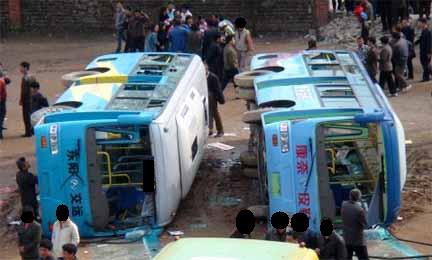Step by step and with a ruthless efficiency, Washington Post correspondent Philip Pan demolishes any remaining hopes we may have harbored that Hu Jintao would be a true reformer and proponent of change in China, at least in regard to openness, freedom of speech and democratic reforms.
More than two years after taking office amid uncertainty about his political views, Chinese President Hu Jintao is emerging as an unyielding leader determined to preserve the Communist Party’s monopoly on power and willing to impose new limits on speech and other civil liberties to do it, according to party officials, journalists and analysts.
Some say Hu has cast himself as a hard-liner to consolidate his position after a delicate leadership transition and could still lead the party in a more open direction. There is a growing consensus inside and outside the government, however, that the 62-year-old former engineer believes the party should strengthen its rule by improving its traditional mechanisms of governance, not by introducing democratic reforms.
This is another topic close to my heart, because I remember debating with other Chinese bloggers in the spring of 2003 whether Hu would really make a difference. There was a strong consensus (of which I was not a part) that as soon as he was free of Jiang’s overbearing control, Hu would make dramatic reforms. The crown jewel of proof was his swift and dramatic handling of SARS once the scandal erupted. He fired the health minister and the mayor of Beijing and held an unprecedented two-hour live press conference in which he appeared to be truly a new type of leader, bringing to mind the early hopes of Gorbachev’s glasnost.
I was skeptical, because I felt if he were a true reformer, he wouldn’t have allowed the government to lie about SARS in the first place. It was plain stupid, as it was a lie they couldn’t possibly contain, and it inflicted direct harm on the people of China. But I was assured, even by some of my best friends in China, that this was a signal of great change. They were turning the microscope on themselves and fessing up to the truth. My cynical response was short and simple: Do they really have any other choice? They have been caught, and now they’ve gog to get out of it somehow. There was nothing else to do if Beijing was going to return to normal and start believing its government again.
And then there’s Tiananmen Square. The same bloggers (most of whom aren’t blogging anymore) assured me that only one things was preventing Hu from opening up about the 1989 catastrophe: Jiang Zemin. Once he was removed from the scene, the doors would open and the truth would make us all free. Interestingly, the silence has, if anything, intensified, and the topic is as taboo today as it was under Jiang.
Party officials said Hu’s statements have led propaganda, education, culture and security officials in Beijing and the provinces to take a harder line against criticism of the government and discussion of sensitive subjects, such as political reform and the 1989 crackdown on the demonstrations in Tiananmen Square.
Over the past few months, nearly a dozen dissident writers have been arrested across the country, including journalist Shi Tao in Hunan province, scholar Zheng Yichun in Liaoning, essayist Zhang Lin in Anhui and painter Yan Zhengxue in Zhejiang. A researcher for the New York Times, Zhao Yan, was detained just before Hu’s speech to the Central Committee, and a well-known essayist, Huang Jinqiu, was sentenced to 12 years in prison days after it. The authorities have also disbarred Shanghai lawyer Guo Guoting, who tried to represent several of the dissidents.
The article also notes the futility of Hu’s efforts to help the oppressed villagers who petition him, which often backfires and gets the petitioners into more trouble with local officials. There’s a lot more to the piece, and you really should read it all. It concludes with a rational explanation from an anonymouse source:
“The party’s authority is gradually declining, and as a result, Hu is less confident and more insecure than the leaders before him,” said a former provincial party chief, who spoke on condition of anonymity. “When a leader feels insecure, he tightens controls.”
I would love to be able to post an article showing that Hu is a true reformer who has strived to bring freedom and fairness to his people. I’d really love to post a story about how censorship in China is loosening and how reporters are now allowed to investigate the government at will. I’d love to report a crackdown on corruption with long-term effects, freeing villagers from the yoke of local oppressors. I just can’t find any such stories, and that’s why my posts on the CCP tend to be critical. If you can send me links to articles on the CCP’s breakthroughs and their dedication to individual liberties, I will post them in a heartbeat. I would love to see some good news; I thought we were seeing some last year with the peasant’s survey that seemed to signal a shft in transparency, and I posted about it numerous times with real optimism. But we were disappointed yet again. I want to be fair and I want to give credit where it is due. What is the CCP doing to bring its people freedom and a greater voice and greater representation? Just let me know, and if the source is reasonable I won’t hesitate to write it up.
Thanks to the anonymous emailer who sent me the link to this story. Always appreciated.

Comments